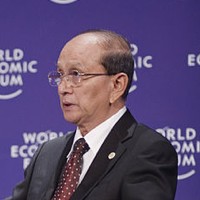Last week, Myanmar’s military launched airstrikes against ethnic rebels from the northern state of Kachin, the latest salvo in a conflict between the Kachin Independence Army (KIA) and Myanmar’s central government that has escalated since a 1994 cease-fire came apart in 2011.
Like other ethnic minorities in Myanmar, the Kachin have long sought more autonomy from the central government of the Southeast Asian nation, also known as Burma, which was under repressive military rule for five decades but has experienced a modicum of reform since President U Thein Sein came to power in 2011. Yet Thein Sein’s ascent was soon followed by a worsening of the conflict between the KIA and the central government that has raised concerns over the prospects for peace.
“It is not at all clear that this issue is a black-and-white issue of good guys and bad guys,” John Blaxland, a senior fellow at the Strategic and Defense Studies Center at the Australian National University, told Trend Lines. The Kachin, he explained, are “actively and violently” resisting the central government. “If the KIA is able to get away with rejecting the authority of the regime, then what are the implications for Burma as a nation?” Blaxland asked, noting the long-standing fear of the balkanization of Myanmar’s ethnic conflicts.

